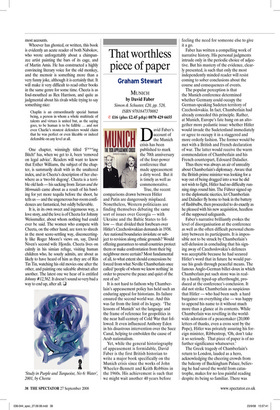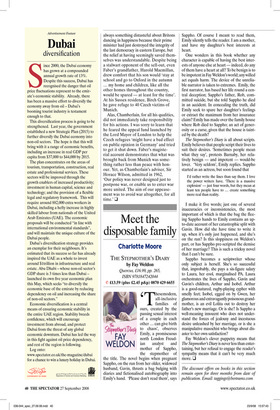That worthless piece of paper
Graham Stewart
MUNICH by David Faber Simon & Schuster, £20, pp. 528, ISBN 9781847370082 ✆ £16 (plus £2.45 p&p) 0870 429 6655 David Faber’s account of the Munich crisis has been published to mark the 70th anniversary of the four-power conference that made appeasement a dirty word. But it is timely as well as commemorative.
True, the recent comparisons drawn between Hitler and Putin are dangerously misplaced. Nonetheless, Western politicians are finding themselves debating the same sort of issues over Georgia — with Ukraine and the Baltic States to follow — that divided their forebears over Hitler’s Czechoslovakian demands in 1938. Are national boundaries inviolate or subject to revision along ethnic grounds? Would offering guarantees to small countries protect them or make confrontation from their big neighbour more certain? Most fundamental of all, to what extent should concessions be forced from what Neville Chamberlain once called ‘people of whom we know nothing’ in order to preserve the peace and quiet of the rest of us?
It is not hard to fathom why Chamberlain’s appeasement policy has held such an enduring appeal for historians. Its failure ensured the second world war. And this was far from the limit of its legacy. ‘The lessons of Munich’ set the language and the frame of reference for geopolitics in the near half-century of Cold War that followed. It even influenced Anthony Eden in his disastrous intervention over the Suez Canal, helping to embolden the cause of Arab nationalism.
Yet, while the general historiography of appeasement is formidable, David Faber is the first British historian to write a major book specifically on the Munich crisis since the works of John Wheeler-Bennett and Keith Robbins in the 1960s. His achievement is such that we might wait another 40 years before feeling the need for someone else to give it a go.
Faber has written a compelling work of narrative history. His personal judgments intrude only in the periodic choice of adjective. But his mastery of the evidence, clearly presented, is such that only the most independently minded reader will resist coming to sober conclusions about the course and consequences of events.
The popular perception is that the Munich conference determined whether Germany could occupy the German-speaking Sudeten territory of Czechoslovakia. In fact, Chamberlain had already conceded this principle. Rather, at Munich, Europe’s fate hung on an altogether more pedantic issue: whether Hitler would invade the Sudetenland immediately or agree to occupy it in a staggered and more orderly fashion. The former would be met with a British and French declaration of war. The latter would receive the warm commendation of Chamberlain and his French counterpart, Edouard Daladier.
Thus there was always an air of unreality about Chamberlain’s diplomacy. Aware that the British prime minister was looking for a way out of being dragged into a war he did not wish to fight, Hitler had no difficulty running rings round him. The Führer signed up to the diplomatic niceties, let Chamberlain and Daladier fly home to bask in the battery of flashbulbs, then proceeded to do exactly as he pleased with his new acquisition, heedless of the supposed safeguards.
Faber’s narrative brilliantly evokes the level of disorganisation at the conference as well as the often difficult personal chemistry between its participants. It is impossible not to be struck by Chamberlain’s self-delusion in concluding that his signing away of Czechoslovakia’s defences was acceptable because he had secured Hitler’s word that in future he would pursue his goals through peaceful means. The famous Anglo-German billet-doux in which Chamberlain put such store was in reality a hastily typed-up afterthought, produced at the conference’s conclusion. It did not strike Chamberlain as suspicious that Hitler — who had been such a hard bargainer on everything else — was happy to append his name to it without much more than a glance at its contents. While Chamberlain was revelling in the worldwide adoration of a peacemaker (20,000 letters of thanks, even a cross sent by the Pope), Hitler was privately assuring his foreign minister, Ribbentrop, ‘Oh, don’t take it so seriously. That piece of paper is of no further significance whatsoever.’ The Greek tragedy of Chamberlain’s return to London, lauded as a hero, acknowledging the cheering crowds from the balcony of Buckingham Palace, believing he had saved the world from catastrophe, makes for no less painful reading despite its being so familiar. There was always something distasteful about Britons dancing in happiness because their prime minister had just destroyed the integrity of the last democracy in eastern Europe, but the relief at having seemingly saved themselves was understandable. Despite being a stalwart opponent of the sell-out, even Faber’s grandfather, Harold Macmillan, drew comfort that his son would ‘stay at school and go to Oxford in the autumn ... my home and children, like all the other homes throughout the country, would be spared — at least for the time’. At his Sussex residence, Birch Grove, he gave refuge to 40 Czech victims of Munich.
Alas, Chamberlain, for all his qualities, did not immediately take responsibility for his actions. I was sorry to learn that he feared the appeal fund launched by the Lord Mayor of London to help the Czech refugees ‘might have a bad effect on public opinion in Germany’ and tried to get it shut down. Faber’s magisterial account demonstrates that what was brought back from Munich was something rather less than peace with honour. Yet, as Chamberlain’s adviser, Sir Horace Wilson, admitted in 1962, ‘Our policy was never designed just to postpone war, or enable us to enter war more united. The aim of our appeasement was to avoid war altogether, for all time.’ ❑











































































 Previous page
Previous page